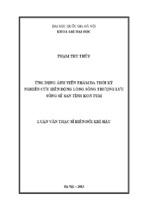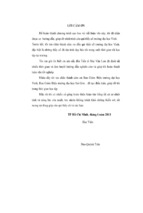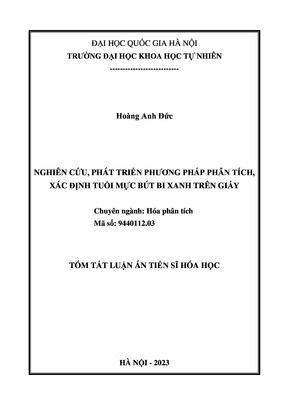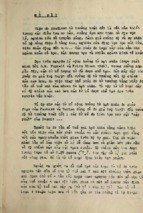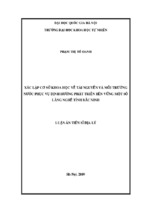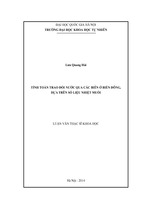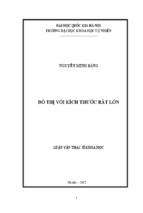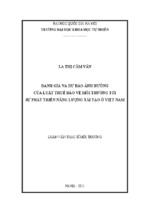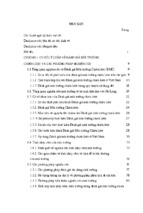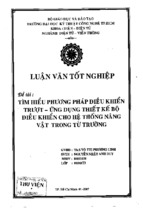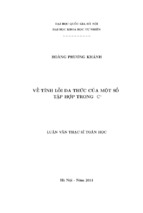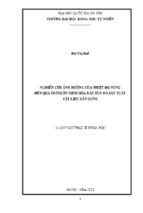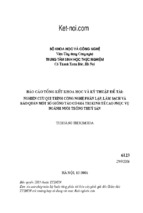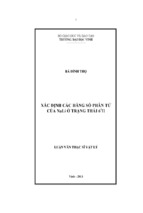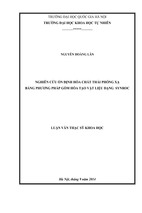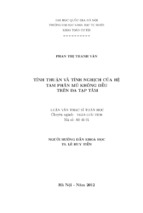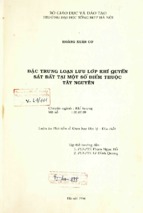VIETNAM NATIONAL UNIVERSITY, HANOI
UNIVERSITY OF LANGUAGES AND INTERNATIONAL STUDIES
FACULTY OF POST-GRADUATE STUDIES
LÊ THỊ HỒNG DUYÊN
ESP TEACHERS’ PERCEPTIONS AND PRACTICES
IN VIETNAMESE CONTEXT
Cách hiểu và thực tế giảng dạy của giáo viên tiếng Anh chuyên ngành
trong bối cảnh Việt Nam
A thesis submitted in fulfillment of the requirements
for the Degree of Doctor of Philosophy
Major: English Language Teaching Methodology
Code: 62140111
Supervisors: Dr. DƯƠNG THỊ NỤ
Dr. ĐỖ TUẤN MINH
Hanoi, 2017
STATEMENT OF AUTHORSHIP
The thesis entitled “ESP Teachers‟ Perceptions and Practices in Vietnamese context”
has been submitted for the degree of Doctor of Philosophy.
I, the undersigned, hereby declare that I am the sole author of this thesis. I have fully
acknowledged and referenced the ideas and work of others, whether published or
unpublished, in my thesis.
My thesis does not contain work extracted from a thesis, dissertation or research
paper previously presented for another degree or diploma at this or any other
university.
Signature:
LÊ THỊ HỒNG DUYÊN
i
ABSTRACT
Compared to well-established research into language teacher cognition, little
investigation has been conducted in the field of ESP teacher cognition. In fact, ESP
teachers‟ perceptions in relation to their practices are not fully documented in both local
and global contexts.
To address such research gap, a multiple case study was conducted with nine ESP
teachers working in three selected universities of medicine and pharmacy in the northern
part of Vietnam. The study aimed at investigating those teachers‟ perceptions and
practices of ESP teaching as well as contextual factors affecting their thoughts and
instructional behaviors. Data were collected from the three main research instruments
including pre-interviews, classroom observations and post-class observation interviews.
The findings showed that the teachers in this study used their intuition to assess their
students‟ needs which were passing the exam and preparing for their future needs. As for
them, ESP teaching was generally not much different from EGP teaching; and the typical
feature of ESP lay in the terminology of the field. As such, their perceptions about
teaching approach strongly oriented to the knowledge transmission, which focused on
provision of basic terminology, grammar structures and basic skills. Additionally, those
teachers‟ practices, which were mainly characterized by Grammar Translation Method,
were in accordance with their perceptions towards the transmission of knowledge. The
consistency in those teachers‟ thinking and instructions were explained by the three main
influential factors including their lack of expert theories and professional development
activities; available sources as institutional guiding norms such as course guides, course
books, tests, experienced colleagues and limited time frame; and a number of national
and institutional guiding authorities.
Although this study does not aim at generalizing the findings to the whole context of
Vietnam, it has depicted the picture of ESP teaching in some Vietnamese contexts. The
major contribution of this study lies in the interpretation of teachers‟ cognition and their
instructions in light of their agency and their teaching ownership. Besides, by placing the
teachers‟ perceptions and practices under different contextual scales, this study argues
that changing one single factor in the system could be insufficient to alter those teachers‟
cognition and instructional behaviors. From the findings, some implications about
theory, research and policy are offered.
ii
ACKNOWLEDGEMENTS
No one who achieves success does so without acknowledging the help of others.
The wise and confident acknowledge this help with gratitude.
-Alfred North WhiteheadAnd with all of my gratitude, I would like to express my whole-hearted thanks to the
ones who supported me during my PhD journey. Without their help, my journey
could not be completed.
Firstly, I would like to express my thankfulness to my chief supervisor- Dr. Dương
Thị Nụ for her willingness to help me from the very start of the journey and her
enthusiastic guidance and sincere sharing during the course. I am also grateful to my
associate supervisor- Dr. Đỗ Tuấn Minh who has greatly inspired me with his
professional working style and who gave me a lot of courage, especially when I got
stuck on my way.
Secondly, my sincere thanks also go to the former Dean Assoc. Prof. Dr. Lê Hùng
Tiến and the current Dean Dr. Huỳnh Anh Tuấn as well as the staff members at the
Faculty of Postgraduate Studies, University of Languages and International Studies
(ULIS), Vietnam National University (VNU), who are always so kind and supportive
during my study time.
Thirdly, I also appreciate all the examiners: Prof. Dr. Nguyễn Hòa, Prof. Hoàng Văn
Vân, Assoc. Prof. Dr. Trương Viên, Assoc. Prof. Dr. Phan Văn Quế, Assoc. Prof. Dr.
Lưu Quý Khương, Assoc. Prof. Dr. Lê Hùng Tiến, Assoc. Prof. Dr. Lê Văn Canh,
Assoc. Prof. Dr. Nguyễn Phương Nga, Assoc. Prof. Dr. Hoàng Tuyết Minh, Assoc.
Prof. Dr. Nguyễn Văn Trào, Dr. Nguyễn Đức Hoạt, Dr. Hoàng Thị Xuân Hoa, Dr.
Huỳnh Anh Tuấn, Dr. Hoàng Thị Hạnh, Dr. Dương Thu Mai, Dr. Vũ Thị Thanh
Nhã, Dr. Trần Thị Duyên, Dr. Nguyễn Thị Hương, Dr. Trần Thanh Nhàn, Dr. Trần
Thị Thanh Phúc and Dr. Ngô Thu Hương who commented on my qualifying papers
and my final thesis. Their insightful comments as well as hard questions sharpened
iii
my mind and provided me with a great deal of ideas to develop my research on the
right track.
Fourthly, I would like to send my deepest gratitude to Dr. Hoang Thi Hanh who
unconditionally shared with me all the necessary skills and knowledge to do
qualitative research. Her extraordinary personality and profound thoughts gave me a
lot of precious lessons which will be with me for my whole life.
I also owe thanks to my colleagues at the Department of Foreign Languages,
Haiphong University of Medicine and Pharmacy who continuously supported me
and showed sympathy with my hard work.
In addition, I would like to convey my thankfulness to all the participating teachers
at the 10 medical universities nationwide who participated in my preliminary
research, especially the nine teachers who accompanied me during a long time of my
main study. The results I have achieved today partially belong to them.
I will also never forget sincere friendship and support of my PhD fellow students:
Ms. Lưu Kim Nhung, Ms. Lê Hương Hoa and Ms. Nguyễn Minh Trâm. We have
been together through thick and thin of our PhD journey. I believe that our
sisterhood will last long even when we are living in far distance. I also recall my
close friends and sisters: Ngọc, Việt, Linh, Tú, Mai and Mai Anh for their help and
encouragement.
Last but not least, unconditional love, sacrifice and care of my family members for
me during the journey cannot be expressed in words. They are also the motivation
for me to overcome all the difficulties and to become a better me now.
iv
TABLE OF CONTENTS
STATEMENT OF AUTHORSHIP .............................................................................. i
ABSTRACT................................................................................................................. ii
ACKNOWLEDGEMENTS ........................................................................................ iii
TABLE OF CONTENTS..............................................................................................v
LIST OF ABBREVIATIONS ................................................................................... viii
LIST OF FIGURES .................................................................................................... ix
LIST OF TABLES ........................................................................................................x
INTRODUCTION ........................................................................................................1
1. Statement of the problem ..........................................................................................1
2. Research aims ...........................................................................................................3
3. Scope of the study .....................................................................................................3
4. Significance of the study ..........................................................................................4
5. Context of the study ..................................................................................................5
6. Organization of the thesis .........................................................................................8
CHAPTER 1: LITERATURE REVIEW ......................................................................9
1.1 Development of English for Specific Purposes (ESP) ...........................................9
1.1.1 Defining ESP ................................................................................................9
1.1.2 ESP development as a global trend ............................................................12
1.1.3 ESP development in Vietnamese context...................................................14
1.2 Major foci in ESP .................................................................................................18
1.2.1 Needs Analysis ...........................................................................................18
1.2.2 ESP practitioners ........................................................................................20
1.2.3 Distinguishing ESP and EGP teaching methodology ................................22
1.2.4 ESP teaching approaches............................................................................24
1.3 Teachers‟ perceptions ...........................................................................................29
1.3.1 Defining teachers‟ perceptions ...................................................................29
1.3.2 Factors affecting teachers‟ perceptions ......................................................30
1.4 Teachers‟ practices ...............................................................................................33
1.4.1 Defining teachers‟ practices .....................................................................33
1.4.2 Factors affecting teachers‟ practices ........................................................33
1.5 Studies on language teachers‟ perceptions and practices .....................................34
v
1.5.1 Relationship between teachers‟ perceptions and practices ........................34
1.5.2 Some theoretical frameworks for exploring teachers‟ perceptions and
practices .....................................................................................................36
1.6 Studies on ESP teachers‟ perceptions and practices .............................................41
1.7 Summary ...............................................................................................................48
CHAPTER 2: RESEARCH METHODOLOGY ........................................................50
2.1 Selection of methodology to the study .................................................................50
2.2 Setting of the study ...............................................................................................53
2.2.1 Selecting the cases and research sites .......................................................53
2.2.2 Researcher positioning .............................................................................60
2.3 The analytical framework of the study .................................................................62
2.4 Data collection methods .......................................................................................65
2.4.1 Semi-structured interviews .......................................................................66
2.4.1.1 Pre-interviews ........................................................................................66
2.4.1.2 Post-class observation interviews ..........................................................68
2.4.2 Classroom observations ............................................................................69
2.5 Transcription and analysis of the data ..................................................................70
2.5.1 Transcription of the data ...........................................................................70
2.5.2 Data analysis .............................................................................................72
2.5.2.1 Analysis of the interview data ...............................................................72
2.5.2.2 Analysis of the observational data ........................................................77
2.6 Trustworthiness .....................................................................................................79
2.6.1 Credibility .................................................................................................79
2.6.2 Transferability...........................................................................................80
2.6.3 Dependability ............................................................................................80
2.6.4 Confirmability...........................................................................................81
2.7 Ethical considerations ...........................................................................................81
2.8 Summary ...............................................................................................................82
CHAPTER 3: FINDINGS ABOUT ESP TEACHERS‟ PERCEPTIONS AND
PRACTICES ...............................................................................................................83
3.1 Teachers‟ perceptions of ESP teaching ................................................................84
3.1.1 Teachers‟ views of students‟ needs ..........................................................84
vi
3.1.2 Teachers‟ perceptions of ESP teaching aims ...........................................87
3.1.3 ESP teaching approaches: Teachers‟ orientation to knowledge
transmission ..............................................................................................95
3.2 Teachers‟ perceptions as reflected in their teaching practices .............................99
3.2.1 Isolated vocabulary teaching ....................................................................99
3.2.2 Explicit instruction of grammar points ..................................................110
3.2.3 Focus on translation and reading ............................................................119
3.2.4 Importance of accuracy and memorization ............................................128
3.3 Factors affecting teachers‟ perceptions and practices ........................................132
3.3.1 Teachers‟ lack of expert theories and professional development activities
................................................................................................................133
3.3.2 Available sources as institutional guiding norms...................................139
3.3.3 Guiding authorities .................................................................................146
3.4 Summary .............................................................................................................151
CHAPTER 4: DISCUSION OF THE FINDINGS ...................................................154
4.1 Revisiting the research questions........................................................................154
4.2 Reflecting the findings on the analytical framework ..........................................164
4.3 Summary .............................................................................................................166
CONCLUSION .........................................................................................................169
1. Summary of the research ......................................................................................169
2. Implications of the study ......................................................................................172
3. Limitations of the study ........................................................................................175
4. Future research avenues ........................................................................................177
REFERENCES .........................................................................................................179
APPENDIX A: CONSENT LETTER FORM
APPENDIX B: WORKING SCHEDULE WITH PARTICIPATING TEACHERS
APPENDIX C: PRE-INTERVIEW GUIDELINES
APPENDIX D: SAMPLE OF A PRE-INTERVIEW TRANSCRIPT
APPENDIX E: SAMPLE OF A POST-CLASS INTERVIEW TRANSCRIPT
APPENDIX F: INFORMATION ABOUT CLASSROOM OBSERVATIONS
APPENDIX G: SAMPLE OF A CLASS OBSERVATION TRANSCRIPT
APPENDIX H: THE INITIAL CODING SYSTEM
vii
LIST OF ABBREVIATIONS
EAP
English for Academic Purposes
EFL
English as a Foreign Language
EGP
English for General Purposes
ELT
English Language Teaching
EOP
English for Occupational Purposes
ESL
English as a Second Language
ESP
English for Specific Purposes
EST
English for Science and Technology
GE
General English
IELTS
International English Language Testing System
TOEFL
Test of English as a Foreign Language
viii
LIST OF FIGURES
Figure 1.1: Needs Analysis jigsaw (Songhori, 2008, p. 22) ...................................... 19
Figure 1.2: A time-line of approaches to ESP (Adopted from Nelson, 2000) ........... 25
Figure 1.3: Burns‟ (1992) intercontextuality framework ........................................... 37
Figure 1.4: Borg‟s (1997) teacher cognition elements ............................................... 39
Figure 1.5: Alzaanin‟s (2014) Cognitive-Ecological Model (CEM) of teaching
EFL writing ............................................................................................. 40
Figure 2.1: The analytical framework of the study ................................................... 63
Figure 2.2: An example of coding episodes in the observational data ...................... 78
Figure 3.1: A summary of the main findings of the study ...................................... 153
ix
LIST OF TABLES
Table 1.1: Summary of topics and methodologies used in previous studies on
ESP teachers‟ cognition ........................................................................... 46
Table 2.1: Researcher‟s choice of qualitative/ inductive research approach ............ 51
Table 2.2: Background information about the participants of the study ................... 56
Table 2.3: Tentative sub-elements within each layer of the adapted analytical
framework ................................................................................................ 63
Table 2.4: An example of sorting and storing one identified code in the
interview data ........................................................................................... 73
Table 2.5: Potential themes and supporting codes .................................................... 75
Table 3.1: Frequency of teachers‟ words regarding knowledge transmission .......... 95
x
INTRODUCTION
1. Statement of the problem
Keeping pace with continuous changes of our society and rapid growth of globalization,
English language teaching (ELT) has become a challenging and demanding occupation.
“One of the effects of the growing importance of global English in professional contexts
has been the rise of ESP teaching at all levels” (Huttner, Smit & Mehlmauer-Larcher,
2009, p. 99). ESP teaching has become a growing trend and mainstream in many areas
and regions, especially in Asia, as what Johns and Dudley-Evans (2001) confirm that
“the demand for English for specific purposes continues to increase and expand
throughout the world” (p. 115). In fact, since its emergence, a lot of efforts have been
made by researchers, educators and teachers in order to find better ways and initiatives to
facilitate ESP teaching and learning.
In Vietnam, ESP teaching is still in its development. Within the allocated time frame
for the English curriculum by the Ministry of Education and Training (MoET), most
teachers of English who work in non-English major universities or vocational
colleges normally take charge of at least one ESP course (Dung & Anh, 2010; Khanh,
2015). Although there are articles and studies detailing the reality of ESP teaching as
well as the challenges of implementing ESP courses within Vietnamese contexts
(Hong, 2005; Oanh, Chau & Chi, 2005; Tuan, 2007; Dung & Anh, 2010; Huong,
2013; Khanh, 2015), little evidence was given about the ways ESP teachers really
think and act, i.e. how they understand about ESP teaching; how they deliver their
ESP classes; and what factors might influence their thinking and behaviors. In order
to depict accurately the picture of ESP teaching in Vietnamese context, it is necessary
to take those issues under ESP teachers‟ lenses into consideration.
In addition, since teaching and learning has been reconceptualized over the last 50
years, “when considering the nature of teaching and what teachers have to learn,
conceptions have moved from process-product perspectives that focus on teaching as
a technical transmission activity to conceptions of teaching as requiring
contextualized decision making” (Schnellert et al., 2008, p. 4). This leads to a focus
1
of research on how teachers‟ cognition affects their behaviors in classrooms. This
trend has been seen through a myriad of studies examining teachers‟ cognition from
different aspects (e.g. Dobson & Dobson, 1983; Pearson, 1985; Thompson, 1992;
Woods, 1996; Aguirre & Speer, 2000; Phipps & Borg, 2009; Kuzborska, 2011;
Melketo, 2012). However, with regard to the ESP field, such type of research is still
very limited, leaving ESP teachers‟ perceptions and practices in the “strange and
uncharted land” (Hutchinson & Waters, 1987, p. 158) of ESP far from being fully
explored and documented. The present study, thus, tried to fill in such research gap of
teachers‟ cognition and practices within ESP domain in both global and Vietnamese
contexts.
Furthermore, a personal and intrinsic motivation to conduct the research comes from
my own experience as an ESP teacher, working at a medical university in Vietnam.
Since my initial steps of teaching ESP seven years ago, I have had opportunities to
observe the teaching practices of teachers at my university and reflect on my own
practice. During such a long time, I have not seen much improvement in the way ESP
courses are taught; we are still teaching the same old book year after year; and our
teaching seems to be routinized. I have wondered if the same situation is happening
in other contexts of ESP teaching; and if we want to improve such stagnant situation,
what should be done and what will be the first step. As aforementioned, although a
wide range of challenges and difficulties of ESP teaching were pointed in current
studies in Vietnam, along with some suggestions such as changing the course book,
designing suitable materials, extending the timeframe and reconsidering the course
assessment format, they seemed to be the mere description of common ESP teaching
situations in Vietnam from the authors‟ experiences rather than deep exploitation of
the root causes. Not until four years ago when I started to read about teachers‟
cognition and its impacts on teachers‟ practices did I identify the importance of
researching teachers‟ thoughts and behaviors in relation to contextual factors so as to
figure out the real teaching situation. Therefore, with close examination in teachers‟
perceptions and practices, the implementation of this present study helped me to
depict a clearer picture of ESP teaching in Vietnam from the lens of those important
2
insiders- ESP teachers- with reference to influential factors in their teaching contexts.
From that, I could see some ways out for my own situation in particular and give
some suggestions for the improvement of such practices to wider contexts in the
country.
2. Research aims
The overall aim of this study is to explore the perceptions and practices of some
groups of ESP teachers working at some medical universities in Vietnam and the
influential factors. In particular, the study seeks to answer the following research
questions:
(1) What are teachers‟ perceptions of ESP teaching?
(2) To what extent are those ESP teachers‟ perceptions reflected in their teaching
practices?
(3) What factors affect those ESP teachers‟ perceptions and their practices?
To address these questions, the research adopted the qualitative approach, using a
multiple-case study in collecting and analyzing data.
3. Scope of the study
This study did not aim at covering all ESP realms or all of the university teachers of
English but within the scope of a qualitative multiple-case study, it focused on
examining nine cases at three selected medical universities in the northern part of
Vietnam, which fitted the research conditions and the established research purpose.
Although there are different mental constructs related to the concept of teacher
cognition, in this study, the notion of teachers‟ perceptions is used as a type of
teacher cognition which means “what teachers think, know and believe” (Borg, 2003,
p. 81). Therefore, in this study, the term “teachers‟ perceptions” is used
interchangeably with teachers‟ cognition. Within this study, teachers‟ perceptions
about different aspects relating to ESP teaching such as ESP teachers‟ roles, the
concept of ESP, ESP pedagogy and their views on the impact of influential factors in
their teaching context were investigated.
3
Besides, regarding teachers‟ practices, this study mainly dealt with the investigation
of teachers‟ instruction of ESP in their classrooms including their teaching
procedures, teaching foci and teaching approach. Therefore, in this study, teachers‟
instructional behaviors, decisions and choices were used to refer to their practices.
Although the results of the study are not intended for generalization, there is
possibility of transferring the findings to other similar contexts.
4. Significance of the study
In theory, by adapting Alzaanin‟s (2014) Cognitive-Ecological Model (CEM) as the
main analytical framework, the study calls for the consideration of teachers‟
perceptions and practices in light of various contextual factors from different scales.
Besides, the qualitative multiple-case approach adopted for this study makes a
methodological contribution to the lack of classroom-based qualitative studies which
have not been well-established within the context of Vietnam. In this study, details
about data collection instruments and procedures of data analysis might be useful for
Vietnamese researchers to conduct similar studies regarding to teachers‟ cognition
and practices.
Additionally, in practice, the study is significant in raising the awareness of ESP
teachers of their own teaching. Through the cases of the teachers in this study, other
ESP teachers in relatable contexts may have opportunities to reflect on their own
teaching. This, therefore, might help to awaken their agency and ownership in
teaching. On the other hand, the study also confirms the importance of viewing
contextual factors systematically in the process of making policy decisions.
Finally, the findings of this study will shed more light on reality of ESP teaching in
the country as well as contextual factors that influence teachers‟ perceptions and
instructional behaviors. This might help to stimulate discussion and promote further
work among teacher educators and policy makers with respect to the improvement of
ESP teaching quality in Vietnamese context.
4
5. Context of the study
This section provides an overview of ESP teaching within Vietnamese educational
and socioeconomic contexts. In particular, it briefly presents the influences of socioeconomic conditions and educational policies on the development and status of ESP
teaching. From that, the present status quo of ESP teaching in Vietnamese context is
delineated.
Vietnam‟s socio-economic context has placed a lot of impacts on the national foreign
language education. Noticeably, the economic reform in 1986 attracted a huge flow
of foreign investments to Vietnam, which motivated Vietnamese people to learn
English in the hope of accessing scientific knowledge of the western world and to
seek for better job opportunities in foreign companies. Such condition led to “English
language fever” (Canh, 2011, p. 17) nationwide and made English “a de facto foreign
language” (Khanh, 2015, p. 227) in Vietnam. During such period, “a greater desire
for specialized study of English became apparent as more Vietnamese desired these
language skills for specific work environments” (Shapiro, 1995, p.8). This trend also
marked the growth of English for Specific Purposes (ESP) teaching and learning in
Vietnam. English for various disciplines has been introduced into English language
curriculum in most universities with the aim to prepare labor sources who are not
only specialists of their fields but also confident in communicating with foreign
partners.
However, the increasing demands of the market economy and the surge of English
language learning in general and ESP in particular did not ensure the provision of
competent English-speaking employees as expected. In fact, “Vietnamese universities
are not producing the educated workforce that Vietnam‟s economy and society
demand […] as many as 50 percent of Vietnamese graduates are unable to find jobs
in their area of specialization” (Vallely & Wikinson, 2008, p. 1). One of the main
reasons was identified as their low English proficiency. This became one of the
obstacles preventing Vietnam to integrate with the world economy (Tu, 2006).
Therefore, the incidence of Vietnam‟s integration into the World Trade Organization
5
(WTO) in 2007 required the Government and the Ministry of Education and Training
(MoET) to seek for measures to improve the situation.
In recognition of the importance of English to the development of national economy
and with the determination in reforming the whole foreign language education system
of the country, the Government approved the National Foreign Language Project
2020 according to the Prime Ministerial Decision number 1400/QĐ-TTg dated 30th
September, 2008 with total investment of VND 9,378 billion from 2008 to 2020. The
project‟s major goal is that “by 2020, most Vietnamese students graduating from
secondary, vocational schools, colleges and universities will be able to use a foreign
language confidently in their daily communication, their study and work in an
integrated, multi-cultural and multi-lingual environment, making foreign languages a
comparative advantage of development for Vietnamese people in the cause of
industrialization and modernization of the country” (Article 1, Decision 1400/QĐTTg). Accordingly, students graduating from primary schools, secondary schools,
high schools and non-English major universities have to achieve the corresponding
levels of A1, A2 and B1- Common European Framework for Reference (CEFR).
However, such objectives seem to be too far beyond the fact. After being
implemented for several years, although the project has raised Vietnamese people‟s
awareness on the importance of learning English, it seems not to achieve the desired
results. In fact, a majority of graduates are still unable to use English. Even in big
universities like Da Nang University, 80% of students from master courses could not
achieve the required level as stated by the project (Hai, 2011).
With regards to ESP teaching at tertiary level, the quality of ESP courses seems to be
doubtful (Dong, 2011). A wide range of challenges and difficulties are identified such
as outdated course books, students‟ low English proficiency, teachers‟ lack of
expertise, limited time frame and ineffective assessment (Dung & Anh, 2010; Hai,
2011; Khanh, 2015; Hoa & Mai, 2016), which lead to the ineffectiveness of ESP
courses at universities. Many questions have been raised about the quality of English
education in general and ESP in particular at tertiary level such as “why are graduates
who were taught ESP at universities unable to use English in their real jobs?”, “what
6
should we do to train students according to the needs of society?”, “what do we miss
in our training program?” or “why are many staff and officials retrained their English
while they were officially trained at universities?” (Dung & Anh, 2010). Although a
number of suggestions for the situation have been offered such as changing the
course books, extending time frame for the course, providing training courses for
teachers or reconsidering the assessment format, they seem to be a list of
recommendations without any strategic planning from the higher authorities.
Furthermore, the implementation of the 2020 Project seems to put more pressure on
administrators at universities in ensuring the required level of English for graduates.
Many students graduated from high schools cannot achieve B1 level as required;
therefore, when they enter universities, they have to be retrained from the start (Hoa,
2011). While the time allocation for English education at tertiary level stays the same
and is even cut down, a number of universities have to sacrifice the ESP section in
their English curriculum in order to spare time for General English (Dong, 2011).
Meanwhile, in other universities where ESP courses are being run, the situation
seems to be “stagnant” (Duyen, 2014).
Based on such status quo, the question of whether ESP courses should be maintained
in Vietnamese context is still of concern (Van, 2010). In other words, there is general
skepticism towards the existence of ESP that Dong (2011) called as a “dilemma”.
Perhaps, removing ESP is considered as a temporary solution of some universities in
order to focus on the requirement regarding graduates‟ English level. In the long run,
ESP teaching is still a necessary step towards learning through English (LTE) which
aims at the integration and renovation of the country (Hoa, 2011). This calls for a
careful review of the situation and strategic plans from higher authorities. However,
at the moment, ESP teachers seem to be struggling with the challenges in their
teaching contexts.
In short, by sketching out educational and socioeconomic contexts of Vietnam in
relation to ESP teaching at tertiary level, the context of the study has been provided.
Besides, the specific contexts of the three universities will be shown in details in
Section 2.2.1 of this thesis. Under such contexts, teachers‟ thoughts and practices are
7
formed and mediated. In order to investigate what teachers perceive about ESP
teaching and how they teach ESP as well as influential factors, it is necessary to take
such contexts into consideration.
6. Organization of the thesis
This thesis comprises three main parts. The first part is the introduction to the study,
which briefly presents the statement of the problem, research aims, scope and
significance of the study. This part also provides information about the context of the
study detailing the overall context of ESP teaching in Vietnam where the study was
conducted.
Following the first part, the second part consists of four chapters. Chapter One
reviews relevant literature to this study including the development of ESP in both
global and Vietnamese contexts, a number of major foci in ESP, teachers‟ perceptions
and teachers‟ practices. In this chapter, previous studies on ESP teachers‟ perceptions
and practices are extensively reviewed in order to identify the research gaps that this
study tries to fulfill. After that, Chapter Two demonstrates in detail the research
methodology of the study from the selection of research philosophy, research
approach to the description of data collection and data analysis procedures as well as
the criteria for ensuring that the study was conducted in reliable and ethical
conditions. Chapter Three is followed with the presentation of three main findings of
the study in line with three established research questions regarding teachers‟
perceptions of ESP teaching, teachers‟ perceptions as reflected in their practices and
the influential factors. Then discussions about the findings are made in Chapter Four
with reference to the literature, the research questions and the analytical framework of
the study, from which the picture of ESP teaching in some Vietnamese contexts is
highlighted.
The final part in this thesis concludes with a summary of the entire research, which is
then followed by implications of the study from both theoretical and practical
perspectives. Besides, some limitations that the researcher had to deal with during the
research process are acknowledged. Finally, a number of suggested avenues for
future research in the area of ESP teaching and teacher cognition are proposed.
8
CHAPTER 1: LITERATURE REVIEW
This chapter reviews a number of relevant concepts and studies to the present study.
Section 1.1 begins with how ESP is defined and the history of ESP development in
both global and Vietnamese contexts with typical characteristics and related research
trends. Then, a number of major foci in ESP including needs analysis, ESP
practitioners, distinguishing ESP and EGP teaching methodology and some current
ESP teaching approaches are presented in Section 1.2. This is followed by Section 1.3
and Section 1.4, in which the concept of teachers‟ perceptions, teachers‟ practices and
influential factors are discussed. The next two sections critically review previous
studies on the relationship between teachers‟ perceptions and practices and with the
focus on related teacher cognition research in ESP field. The final section summarizes
this chapter and highlights the research gap which this study aims to fulfill.
1.1 Development of English for Specific Purposes (ESP)
1.1.1 Defining ESP
Since its emergence in the 60s of the previous century, undergoing a lot of
controversies and development over the decades, ESP has grown to become one of
the most prominent parts of EFL teaching (Anthony, 1997). Considered as “an
exciting fast-developing multi-disciplinary subject of study” in the world (Chen,
2009, p. 56), ESP is gaining more and more attention in the English teaching area and
many other fields. However, “a definition of ESP that is both simple and watertight is
not easy to produce” (Strevens, 1980, p. 109).
The literature has seen a great deal of efforts in defining ESP. In the early days, ESP
was considered as the teaching of technical vocabulary of a given field (Swales,
1971). Later on, Hutchinson and Waters (1987), instead of showing directly what ESP
is, described what ESP isn’t, from which three main claims are made, including (1)
ESP is not a matter of teaching „specialized varieties‟ of English or any special forms
of the language; (2) ESP is not just a matter of science words and grammar for
Scientists, Hotel words and grammar for Hotel Staff but there is much more to
communication than just the surface features that we read and hear; (3) ESP is not
9
- Xem thêm -


